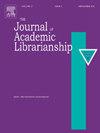Towards digital information literacy guidelines for African libraries: a survey of the relationship between digital and information literacy of university students in Ghana
IF 2.3
3区 管理学
Q2 INFORMATION SCIENCE & LIBRARY SCIENCE
引用次数: 0
Abstract
The relationship between digital literacy and information literacy has been suggested in many studies. Despite this suggestion, research providing context-related data and research findings for university librarians and educators in Ghana is inadequate. This has left many academic librarians with the difficult task of training students for the digital world on their own, with insufficient resources to provide guidance. The insufficient resources include context-relevant data to guide policy, clear research findings to support actions and evidence to convince university policy makers about the need for course reform and increased access to technology.
This paper uses a correlational design in a sample of Ghanaian university students. It investigates the relationship between digital literacy, information literacy, access to and use of technology and intention to use technology. Pearson correlation coefficients were computed for pairwise relationships between the variables. The relationship between information literacy and digital literacy was conceptualized as digital information literacy and backed with data from the study.
Correlations between digital literacy and information literacy were supported, and a simple linear regression further showed that information literacy predicts digital literacy. A correlation between the intention to use technology and digital literacy, as well as information literacy and intention to use technology, was supported.
The findings suggest that academic librarians in Africa improve information literacy training to cover digital topics. University policy makers are advised to improve access to and use of digital technology, be open to the ethical use of digital sources of information and ensure that all students receive training in digital sources of information and new approaches.
面向非洲图书馆的数字信息素养指南:加纳大学生数字与信息素养关系的调查
数字素养与信息素养之间的关系已经在许多研究中提出。尽管有这样的建议,为加纳的大学图书馆员和教育工作者提供与上下文相关的数据和研究结果的研究是不够的。这使得许多学术图书馆员面临着一项艰巨的任务,即在没有足够资源提供指导的情况下,自己培养学生适应数字世界。不足的资源包括指导政策的背景相关数据、支持行动的明确研究结果和说服大学决策者需要进行课程改革和增加技术获取的证据。本文采用相关设计在加纳大学生的样本。它调查了数字素养、信息素养、技术的获取和使用以及使用技术的意图之间的关系。计算变量之间的成对关系的Pearson相关系数。信息素养和数字素养之间的关系被概念化为数字信息素养,并得到研究数据的支持。数字素养与信息素养之间的相关性得到了支持,简单的线性回归进一步表明,信息素养预测数字素养。使用技术的意愿与数字素养以及信息素养与使用技术的意愿之间存在相关性。研究结果表明,非洲的学术图书馆员提高了信息素养培训,以涵盖数字主题。建议大学政策制定者改善数字技术的获取和使用,对数字信息来源的道德使用持开放态度,并确保所有学生都接受数字信息来源和新方法的培训。
本文章由计算机程序翻译,如有差异,请以英文原文为准。
求助全文
约1分钟内获得全文
求助全文
来源期刊

Journal of Academic Librarianship
INFORMATION SCIENCE & LIBRARY SCIENCE-
CiteScore
5.30
自引率
15.40%
发文量
120
审稿时长
29 days
期刊介绍:
The Journal of Academic Librarianship, an international and refereed journal, publishes articles that focus on problems and issues germane to college and university libraries. JAL provides a forum for authors to present research findings and, where applicable, their practical applications and significance; analyze policies, practices, issues, and trends; speculate about the future of academic librarianship; present analytical bibliographic essays and philosophical treatises. JAL also brings to the attention of its readers information about hundreds of new and recently published books in library and information science, management, scholarly communication, and higher education. JAL, in addition, covers management and discipline-based software and information policy developments.
 求助内容:
求助内容: 应助结果提醒方式:
应助结果提醒方式:


